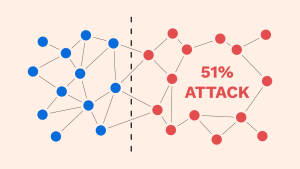The Future of Blockchain Security and Quantum Computing
Blockchain technology is widely regarded as one of the most secure systems in the digital world. The cryptographic algorithms underpinning Bitcoin, Ethereum, and other cryptocurrencies make them nearly impossible to hack using today’s computing power. However, the rise of quantum computing poses a significant challenge to this security model. Quantum computers, which leverage the principles of quantum mechanics, have the potential to break traditional cryptographic methods, threatening the security of decentralized networks.
As blockchain technology continues to evolve, developers are working on quantum-resistant solutions to future-proof these networks. If blockchain security is compromised, the entire foundation of cryptocurrencies, smart contracts, and decentralized applications (dApps) could be at risk. In this article, we’ll explore how quantum computing threatens blockchain security, the current efforts to build quantum-resistant blockchains, and what it means for the future of decentralized finance (DeFi).
At EPIQ Trading Floor, we help traders stay ahead of industry trends, providing real-time insights, trade signals, and expert coaching. Use code “BLOG” at checkout for 10% off and get a risk-free 3-day trial to experience the tools and strategies that professional traders use. Cancel anytime within 72 hours without being charged. Join now.
How Quantum Computing Threatens Blockchain Security
Quantum computers are not just an upgrade over traditional computers; they represent a completely different approach to computation. Unlike classical computers that use binary bits (0s and 1s), quantum computers use qubits, which can exist in multiple states simultaneously due to the principles of superposition and entanglement. This allows them to perform complex calculations exponentially faster than traditional machines.
The primary concern for blockchain security is that quantum computers could break asymmetric encryption algorithms used in cryptographic protocols. Bitcoin, Ethereum, and many other blockchains use Elliptic Curve Digital Signature Algorithm (ECDSA) for securing transactions and SHA-256 hashing for mining and consensus mechanisms. A sufficiently advanced quantum computer could theoretically break ECDSA, allowing an attacker to forge digital signatures and gain unauthorized access to crypto wallets.
According to research by the National Institute of Standards and Technology (NIST), current cryptographic methods such as RSA and ECC could be broken by quantum computing in the coming decades. As blockchain adoption grows, ensuring that networks remain secure against quantum threats is crucial for long-term sustainability.

Developing Quantum-Resistant Cryptographic Algorithms
To counter the potential threat of quantum computing, researchers and developers are working on post-quantum cryptography (PQC) solutions. These cryptographic methods are designed to withstand attacks from quantum computers while maintaining efficiency and scalability. Several approaches are currently being explored:
One promising direction is Lattice-Based Cryptography, which relies on mathematical problems that are believed to be resistant to quantum attacks. Lattice-based encryption methods, such as Learning With Errors (LWE) and NTRUEncrypt, are among the leading candidates for post-quantum security. These methods are being considered as potential replacements for traditional cryptographic systems in blockchain networks.
Another approach is Multivariate Polynomial Cryptography, which involves complex polynomial equations that remain secure even against quantum computing power. This form of encryption is being studied for its potential use in securing blockchain transactions and identity verification systems.
Additionally, Hash-Based Cryptography provides another layer of security by using functions such as Merkle Signature Schemes (MSS) and SPHINCS+, which rely on the complexity of hash functions rather than number theory. This method ensures that even if quantum computers become capable of breaking current encryption, hash-based systems remain secure.
The development of Quantum Key Distribution (QKD) is also gaining traction as a means of securing communications within blockchain networks. Unlike traditional encryption methods, QKD leverages quantum mechanics to create cryptographic keys that are immune to eavesdropping. If successfully integrated, QKD could enhance the privacy and security of blockchain transactions.
Blockchain Networks Adapting to Quantum Resistance
Several blockchain projects and organizations are actively researching and developing quantum-resistant security solutions. Ethereum 2.0 developers have acknowledged the risks posed by quantum computing and are exploring upgrades that could incorporate quantum-safe encryption. Similarly, projects like Bitcoin’s Taproot Upgrade are designed to improve privacy and security, potentially paving the way for quantum resistance.
Some blockchain startups are specifically focused on building quantum-resistant blockchains. Projects like QANplatform and Quantum Resistant Ledger (QRL) aim to implement post-quantum cryptographic methods into blockchain infrastructure. These platforms use lattice-based cryptography and other post-quantum encryption techniques to ensure their networks remain secure even in the face of quantum computing advancements.
The transition to quantum-resistant blockchains will likely take time, as upgrading existing networks requires significant research, testing, and consensus from the crypto community. However, as quantum computing technology progresses, adopting quantum-safe encryption will become a priority for blockchain developers and institutions.

Final Thoughts: Future-Proof Your Crypto Knowledge with EPIQ
The evolution of quantum computing presents both challenges and opportunities for blockchain technology. While the threat of quantum attacks is still years away, the industry must remain proactive in developing quantum-resistant security solutions. As blockchain networks evolve, staying informed and prepared will be crucial for traders, investors, and developers alike.
At EPIQ Trading Floor, we help traders stay ahead of emerging trends in blockchain security, DeFi, and market opportunities. Our exclusive members-only platform provides access to trade signals, expert coaching, and real-time market analysis to give you an edge in the ever-changing crypto landscape.
✅ Live trade signals
✅ Members-only livestreams
✅ One-on-one coaching
✅ Advanced trade setups and strategies
Use code “BLOG” at checkout for 10% off and start your risk-free 3-day trial today. Cancel anytime within 72 hours without being charged.
Disclaimer
This content is for educational purposes only and should not be considered financial advice. Cryptocurrency investments involve risk, and past performance does not guarantee future results. Always conduct your own research before making investment decisions.










Responses